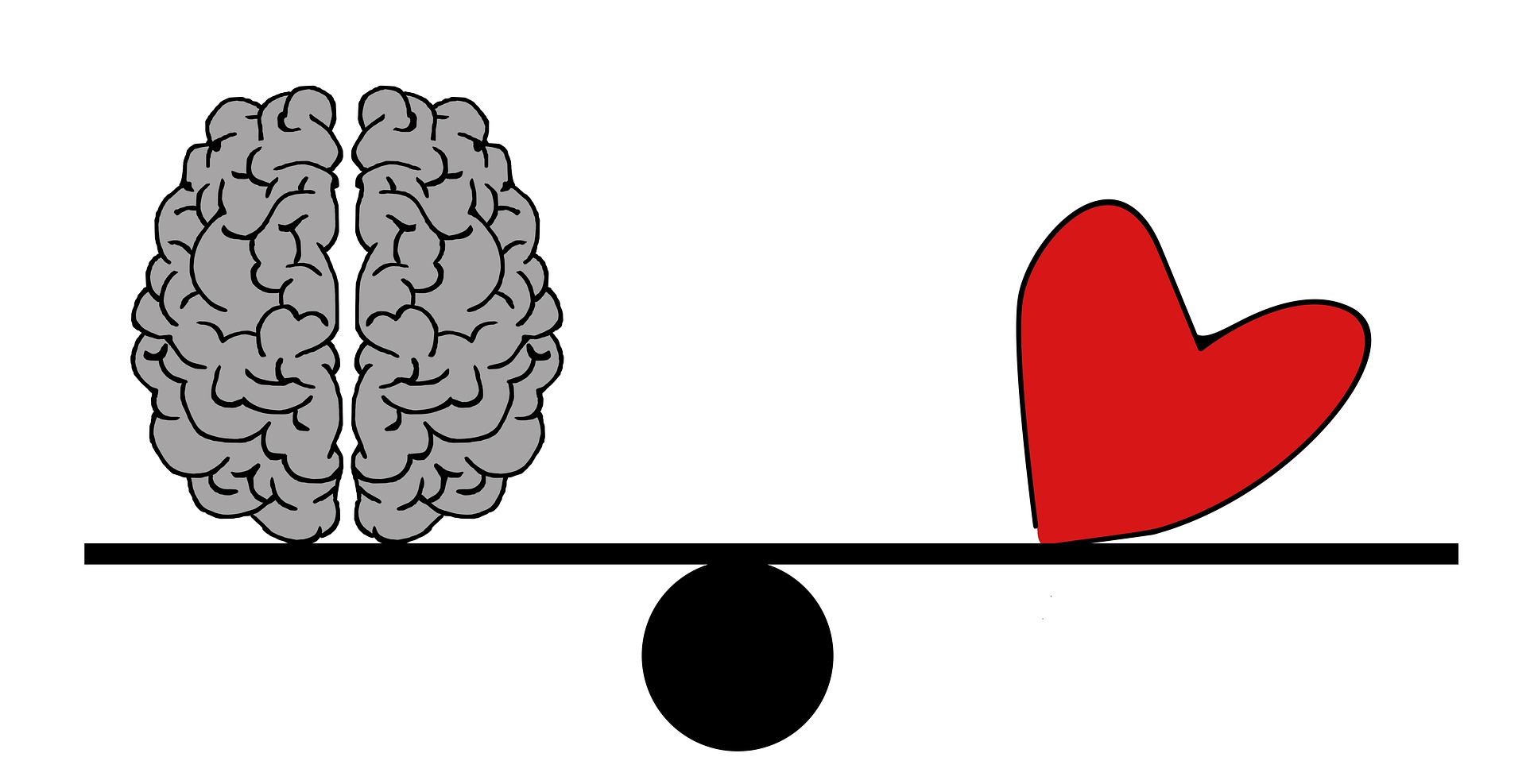
by Alissa Klugh
In working with hundreds (and now maybe thousands) of people, one of the biggest issues I work on is heartache and heartbreak. It doesn't matter the age, it doesn't matter the gender, it doesn't matter the sexuality - Even when someone comes into my office wanting to work on something else, we inevitably circle back to past relationships that were impactful.
One of the most complex things that we can explore is relationships. There are so many moving parts in relationships, why we got together, why we stayed together, the peaks and valleys that come from within the relationship. And finally, the inevitable end (or perceived end) to the relationship. This is where I usually start with my client, it's when most people seek therapy - then we work backward to help them heal so that they can move forward.
Something that comes up constantly and consistently in these situations is the paradox between the head and the heart. Have you ever found yourself stuck between the two? The push and the pull between what is logical and what "feels" right is so challenging. Here are some insights that I've had both in my personal and professional life when dealing with this paradox. You decide if you can relate.
Sharing this with you in the second-person is intended to demonstrate that we all have these experiences.
There is a lot on your mind. Your heart is full, yet heavy. You have a lot of uncertainties, but also feel like you know the answers, instinctually. It's hard. To still have love for someone feels full, yet also devastating. At this point, if there were any chance at a future, it'd be one with continued uncertainties, a lack of trust, and a confused, convoluted understanding of what is intended for the relationship.
You would know what you're getting, if you would try to make something work - to go back and try again, because you know they haven't changed and may not have the interest in changing anytime soon. The potential for them to continue to hurt you still exists. This always exists, as long as you are being vulnerable. You know you should just cut them out of your life, but struggle with doing so. "Block them from social media" "Block them from your phone" is advice that is a lot easier said by the giver of the advice than the person who is wounded. This is you. The victim. At least, that's the way it feels. You get ready to do it, maybe even do it for a while, but then decide not to - falling back into the feelings that you've been feeling and the dangerous situation for your heart. It sucks.
Your head and your heart say two different things.

What do you do when they don't agree? One speaks with logic. It takes actual facts and points you in a healthy direction. It knows what is going to lead you down the path of least resistance. It's the thing that gives your friends sound advice. We know it makes sense. It's the right kind of critical. It weighs out the pros and cons. It's also, more often than not, in complete opposition of your heart.
Your heart has its own ideas.

It's what makes you feel. It makes you remember the hard times and what it takes for you not to relive the pain. It guides you in experiencing love, joy, and happiness. All of these beautiful life experiences. The problem is, it doesn't always guide you toward sustainability of those emotions all of the time. It guides you toward these blissful emotions, no matter how brief - how temporary. It knows nothing about time. It knows nothing about circumstance. It only knows what it feels like to experience these emotions. It knows what it wants, what feels good for the here-and-now, but does not speak with logic. It whispers to you all of the bad ideas that you know, deep down, probably aren't good for you - but, damn it, they feel good. It speaks with emotion - our driving force. What is going to feel the best right now and what will help us feel the least amount of pain - never mind the pain that you may feel directly after the joy and bliss.
The heart isn't about longevity. It's about instant gratification.
So, why are we given the head and the heart, when they are so clearly in opposition?
Why do we constantly feel like we need to choose?
Because, to be honest, the chances are, we are going to choose the heart. Again, and again - until our brains finally scream at us loud enough to do the logical thing that we listen. Or until we have no other choice because we've been hurt so much. Or, maybe it's because the other person no longer is giving us that chance.
But do we really listen? We keep wanting our hearts to be right. We keep touching the flame that burns us, hoping that we'll either get used to the burn or that it'll magically stop hurting us this time.
We are thwarted into what feels good, now, and are left to pick up the pieces after it is all over - all while our brains shame us for making that stupid, heart-based decision...again.
To choose the brain is to choose a life of perceived basic contentment. A life of logic and no excitement. At least that's what our hearts want us to believe.
How do we keep processing the pain that we repeatedly put ourselves through? We are so determined that we can "handle it" this time, that we are strong enough that we won't magically feel the devastation that we have felt before. We are not invincible. Our brains want us to believe that we are. That we are resilient and can bounce back from anything, because, in all honesty, we can.
The biggest difference between our minds and our hearts: The brain can bend. The heart can break.
Can you relate to this paradox? Does your mind fight what your heart says to do? Let's not even begin to talk about the gut and it's role in all of this. The truth is, if we want something enough, we are going to justify our actions. We are going to excuse the inexcusable. We are going to make the unjustifiable, justifiable. We are going to do what we want to do, no matter what. Even if this is just a temporary fix and if it leads to pain.
One of the biggest challenges is that our minds encourage us to find the Agape love, while our hearts push for the Eros love. The agape love is secure. It is safe. It is solid and meaningful, but does not necessarily hold a great deal of passion. But that Eros love, man, it's a beast. It's unconditional love. The type of love that makes you feel like you would do anything for that other person, and you probably do. Its passionate. Its lightning bolts. Its the ups and downs. Its extreme. This is what we tend to seek. Rather than the stable, meaningful, and healthy love, we seek the love that is confusing and emotional. We look for what is shown to us in movies, in social media, in literature. It's the type of love that we have longing for, but, unfortunately, does not always serve us well.
When we throw in the mind-heart paradox, the brain wants us to be safe. It chooses the Eros. But the heart. That dang heart. It wants to feel and it doesn't matter if it's the good feels or not. It's just a strong, powerful feel. And, this is where we get stuck. Safe and secure? Or adventurous and passionate? I know what sounds like the best pick, but is it the pick that is going have longevity? Probably not.
We do not make changes until we are truly ready. We can have our minds, our families, and our friends encouraging us to make all the changes in the world - and they may make complete sense; however, if we are not ready to make different choices... we will remain the same. The same stuck. The same small joys. The same big pains.
We will learn. But we will learn in our own time.
Patience can be so challenging. But we will learn. We will move onto what best serves us. We will begin to make more logical choices over time. We will continue to make mistakes, to back-step. But we will get there. We will continuously be given the same situations until we learn the lessons we were meant to learn.

Being a therapist and a human, I understand all of this too well. I recognize that challenges of change and am grateful when someone is ready enough that they show up in my office. With that presence comes accountability - the accountability to start to make changes, to contemplate them, and to make the wrong choices sometimes. These are just all a bunch of mini lessons taking us down the path where we need to be.
If you related to this article and are interested in starting your own path to change, you can schedule an appointment with one of our skills clinicians, today by calling 412.367.0575 or by clicking here.
